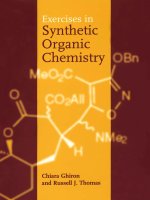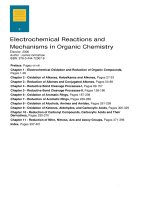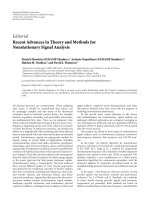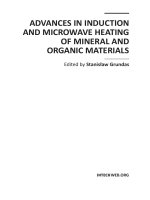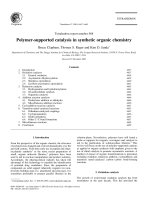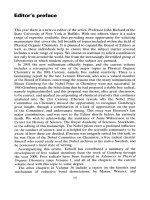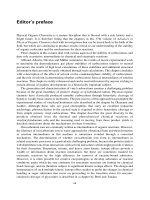Advances in synthetic organic chemistry and methods reported in US patents
Bạn đang xem bản rút gọn của tài liệu. Xem và tải ngay bản đầy đủ của tài liệu tại đây (9.69 MB, 705 trang )
Advances in
Synthetic Organic Chemistry
and Methods Reported in US Patents
www.pdfgrip.com
This Page is Intentionally Left Blank
www.pdfgrip.com
Advances in
Synthetic Organic
Chemistry and Methods
Reported in US Patents
Thomas F. DeRosa
AMSTERDAM • BOSTON • HEIDELBERG • LONDON
NEW YORK • OXFORD • PARIS • SAN DIEGO
SAN FRANCISCO
•
SINGAPORE
•
www.pdfgrip.com
SYDNEY
•
TOKYO
Elsevier
The Boulevard, Langford Lane, Kidlington, Oxford OX5 1GB, UK
Radarweg 29, PO Box 211, 1000 AE Amsterdam, The Netherlands
First edition 2006
Copyright © 2006 Elsevier Ltd. All rights reserved
No part of this publication may be reproduced, stored in a retrieval system
or transmitted in any form or by any means electronic, mechanical, photocopying,
recording or otherwise without the prior written permission of the publisher
Permissions may be sought directly from Elsevier’s Science & Technology Rights
Department in Oxford, UK: phone (+44) (0) 1865 843830; fax (+44) (0) 1865 853333;
email: Alternatively you can submit your request online by
visiting the Elsevier web site at and selecting
Obtaining permission to use Elsevier material
Notice
No responsibility is assumed by the publisher for any injury and/or damage to persons
or property as a matter of products liability, negligence or otherwise, or from any use
or operation of any methods, products, instructions or ideas contained in the material
herein. Because of rapid advances in the medical sciences, in particular, independent
verification of diagnoses and drug dosages should be made
British Library Cataloguing in Publication Data
A catalogue record for this book is available from the British Library
Library of Congress Cataloging-in-Publication Data
A catalog record for this book is available from the Library of Congress
ISBN-13: 978-0-08-044474-1
ISBN-10: 0-08-044474-1
For information on all Elsevier publications visit our
website at books.elsevier.com
Printed and bound in The Netherlands
06 07 08 09 10
10 9 8 7 6 5 4 3 2 1
Working together to grow
libraries in developing countries
www.elsevier.com | www.bookaid.org | www.sabre.org
www.pdfgrip.com
To my loving wife,
Barbara
www.pdfgrip.com
This Page is Intentionally Left Blank
www.pdfgrip.com
Functional Group Contents
(Patent Titles)
Introduction
xvii
Acids and Derivatives
1
Aromatic Carboxylic Acid Derivatives
Azinyloxy, and Phenoxy-Diaryl-Carboxylic Acid Derivatives, Their Preparation and Use
as Mixed ETA/ETB Endothelin Receptor Antagonists
Cinnamic Acid Derivatives
Compounds Derived from Benzoic Acid Esters, Composition Containing Said Compounds
and Use Thereof
1,2-Diarylmethylene Derivatives, Their Methods of Preparation, and Their Uses in
Therapeutics
Geranic Acid Derivatives
Halogenated Cinnamic Acids and Esters Thereof, Processes for the Preparation Thereof
and Halogenated Aryldiazonium Salts
Halogenation Catalyst
Method for Producing Alkoxy Malonic Acid Dinitriles
Phosphonosuccinic Acid Derivatives, Processes for Their Preparation and Medicaments
Containing These Compounds
Preparation of Cyclohexane Carboxylate Derivatives
Water Soluble Fullerenes with Antiviral Activity
Alcohols
1
5
8
12
14
18
20
22
24
26
28
33
36
Butyne Diol Derivatives
1,2-Dithin Antiinfective Agents
Oligiocycloalkanoid Compounds and Methods of Use
Polymers with Controlled Physical State and Bioerodibility
4-Quinolinemethanol Derivatives as Purine Receptor Antagonists
Synthesis of 5-Decenyl Acetate and Other Pheromone Components
Aldols
36
41
44
48
50
53
55
Stereospecific Synthesis of Aldols
55
www.pdfgrip.com
FUNCTIONAL GROUP CONTENTS
viii
Aldehydes
58
Process for Selective Catalytic Oxidation of Olefins to Aldehydes, Ketones with Cleavage
of C==C Bonds
Alkenes
58
60
Carbonyl-Containing Compounds
60
Alkynes
62
Diaryl-enynes
DNA-Cleaving Anti-Tumor Agents
62
66
Amides
70
Adamantane Derivatives
o-Anisamide Derivatives
Benzamide Analogues Useful as PARP (ADP-Ribosyltransferase, ADPRT) DNA Repair
Enzyme Inhibitors
Carboxamide Compositions, Methods, and Compositions for Inhibiting PARP Activity
Heterocyclic Amides
Phosphoramide Compounds
Amines
70
73
76
79
82
87
90
Aminophenyl Ketones Derivatives and a Method for the Preparation Thereof
Arylamine Synthesis
Fungicidal Spirocyclic Amines
Method for Producing Propargylamine Compounds
One Pot Process for the Preparation of
1-[2-Methylamino-(4-Methoxyphenyl)-Ethyl]Cyclohexanol
Organic Electroluminescence Device and Phenylenediamine Derivative
Process for Preparing N-Substituted Hydroxylamines and Salts Thereof
Sodium Channel Modulators
Substituted 2-Aminoalkyl 1,4-Diaminobenzene Compounds and Oxidation Dye Precursor
Containing the Same
Aminoacids
90
94
97
101
104
106
110
112
115
117
Aminoindanes
Aminopropylphosphinic Acids
Cyclic Aminoacids and Derivatives Thereof Useful as Pharmaceutical Agents
Isocyanoalkyl, Carbonic Acid Derivatives, Their Conversion into Secondary Amidoalkyl
Carbonic Acid Derivatives by Isocyanide Multicomponent Reactions, as well as these
Secondary Amidoalkyl Carbonic Acid Derivatives
Spirodiamino Acid Scaffold for Combinatorial Synthesis
Anthracenones
117
120
122
125
128
132
10-Substituted 1,8-Dihydroxy-9(10H) Anthracenone Pharmaceuticals
Aza and Diaza Bi- and Tricyclics
132
136
Bi- and Tri-Cyclic Aza Compounds and Their Uses
Certain Tricyclic Substituted Diazabicyclo[3.2.1]octane Derivatives
Dopamine Transporter Imaging Agent
www.pdfgrip.com
136
141
144
FUNCTIONAL GROUP CONTENTS
ix
N-Alkyl and N-Acyl Derivatives of 3,7-Diazabicyclo-[3.3.1] Nonanes and Selected Salts
Thereof as Multiclass Antirrhythmic Agents
Process for the Manufacture of Tropenol
Aza Benzazolium Salts
147
150
153
Aza-Benzazolium Containing Cyanine Dyes
Aza-Dihydroquinoxaline
153
156
8-Aza, 6-Aza and 6,8-Diazo-1,4-dihydroquinoxaline-2,3-diones and the Use Thereof as
Antagonists for the Glycine/NMDA Receptor
Aza-Indolyls
156
159
Aza-Indolyl Derivatives for Treating Obesity
Aza-Oxindoles
159
162
Substitued Aza-Oxindole Derivatives
162
Azides
165
Stereoselective Ring Opening Reactions
Aziridines/Diazirines
165
170
Diazirine Derivatives of Aromatic Heterocyclic Compounds
Preparation of N-Arylmethyl Aziridine Derivatives 1,4,7,10-Tetraazacyclododecane
Derivatives Obtained Therefrom and N-Arylethyl-ethanolamine Sulfonate Esters as
Intermediates
Process for Producing Aziridine Compounds
170
173
176
Benzodiazopines
178
Benzodiazepines
178
Benzoxazoles
182
Benzoxazoles
182
Benzopyrans
186
Benzopyran Derivatives
186
Benzothiophenes
190
Pentacyclic Compounds, Intermediates, Processes, Compositions, and Methods
Benzotriazole
190
195
Method of Synthesizing t-Amido-Substituted 2-(2-Hydroxyphenyl)benzotriazole
Compounds in a One-Step Process
Carbamates/Ureas
195
199
Herbicidal Sulfonylureas, Their Preparation and Use
Process for the Preparation of Aminocarbonyl Derivatives of Geneseroline Having
Selective Brain Anticholinesterase Activity
Catalysis
199
202
205
Highly Reactive Form of Copper and Reagents Thereof
Lewis Acid Catalyst Composition
www.pdfgrip.com
205
208
FUNCTIONAL GROUP CONTENTS
x
Cumulenes
Aromatic Allene Compounds of the Formula CH2 ==CH-O n -R- A
R is an Aromatic Group and Preparation Thereof
Preparation of Unsaturated Ketones
(S)-4-Amino-Hepta-5,6-Dienoic Acid and Intermediates Thereof
211
m
in Which
Cyanohydrins
211
214
217
220
Method for the Stereoselective Production of Substituted Cyclohexylanhydrins
Cyclodextrane/Dextrane
220
223
Conjugation of Biomolecules Using Diels-Adler Cycloaddition
Nohr-McDonald Elimination Reaction
Cyclopentadiene
223
227
230
Cyclopentadienyl Derivatives and Process for Their Preparation
Cyclopropanes
230
233
Aryl Phenylcyclopropyl Sulfide Derivatives and Their Use as Cell Adhesion Inhibiting
Anti-Inflammatory and Immune Suppressive Agents
Cyclic Compounds Having a Cycloalkylene Chain
2-Hydroxymethylcyclopropylidene-Methylpurines and -Pyrimidines as Antiviral Agents
Process of Producing Cyclopropanecarboxylate Compounds
Process for the Preparation of Methylenecyclopropane
Synthesis of Cyclopropaneacetylene by a One Pot Process
Dentrimer
233
236
240
245
247
249
251
Dentrimeric Fullerene Derivatives, Process for Their Preparation, and Use
as Neurprotectants
Starburst Conjugates
Enamines
251
255
258
Use of Enamines as Light Protection Agents
Enaminones
258
261
Phenyl-Substituted Cyclic Enaminones
Ethers
261
265
Diaryl Ether Condensation Reactions
Preparation and Use of Ionic Liquids in Microwave-Assisted Chemical Transformations
Wurster’s Crown Ligands
Formazan
265
268
270
272
Formazan Metal Complexes
272
Furazancarboxylic Acid Derivatives
Hydroxymethylfurazancarboxylic acid derivatives
Furanones
275
275
278
Furanone Derivatives
278
www.pdfgrip.com
FUNCTIONAL GROUP CONTENTS
xi
Guanidines
280
Cyclic Guanidine Derivatives and Their Use as Pesticides
Guanines
280
283
Substituted O6 -Benzyl-8-Aza-Guanines
Hydrazine
283
286
Diacylhydrazine Derivatives
Method for Synthesizing Hydrazodicarbonamide
Imidazole
286
290
292
Method for Preparing Cycloheptimidazoles
Substituted Imidazole Compounds
Imidazolidine
292
295
299
Cis-Imidazolines
Spiroimidazolidine Derivatives, Their Preparation, Their use and Pharmaceutical
Preparations Formed Therefrom
Imidazolone
299
302
307
Fungicidal 2-Imidazolin-5-ones and Imidazoline-5-thiones
Imidazoltriazionones
307
311
2-Phenyl Substituted Imidazotriazinones as Phosphodiesterase Inhibitors
Imide Derivatives
311
315
Photocleavable Agents and Conjugates for the Detection and Isolation of Biomolecules
Process for the Preparation of Alkyl 4[2-(Phthalimido)ethoxy]-Acetoacetate
Iminocarboxylic Acid Methyl Amides
Preparation of -Methoxyiminocarboxylic Acid Methylamides and Intermediates Therefore
Indoles
315
320
322
322
326
Process for the Preparation of Indole Derivatives and Intermediates of the Process
Synthetic Compounds for Treatment of Inflammation
Tetrahydro- -Carbolines
Indoline
326
331
333
337
Amination Process
337
Isocoumarins
341
Process for Preparing Isocoumarins
341
Isoxazolines
345
Method for Producing Isoxazoline-3-yl-acyl Benzene
Ketones
345
349
Acetoacetic Acid Derivatives, Process for Their Preparation and Their Use
Methods for Making Substituted Phenylketoenols
www.pdfgrip.com
349
352
FUNCTIONAL GROUP CONTENTS
xii
Process for Preparing 3-Hydroxymethyl-4-(Aryl or Heterocyclic)-Cyclopentanones
Process for Preparing Trifluoromethyl Ketones
Process for the Preparation of High Purity Alkyladamanantyl Esters
Lactams
355
360
362
364
Anticonvulsant and Anxiolytic Lactam and Thiolactam Derivatives
-Lactams as Antiproliferative Agents
-Lactam-like Chaperone Inhibitors
N-Thiolated -Lactam Antibiotics
Process for Preparing -Lactam Compounds
6-(Spirocyclopropyl)-Penicillanic Acid-4,4-Dioxides
Lactones
364
367
371
373
376
379
382
Benzylidene- -Butryolactones, Process for Their Preparation and Their Use as UV
Absorbers
Ring-Opened Azlactone Initiators for Nitroxide-Mediated Polymerization
Macocyclic Rings
382
385
388
-Diketone Compounds, -Diketone Compounds Coordinated to Metal, Method
of Organic Synthesis with These, and Catalyst
1,4-Dioxacylcycloalkane-2-one and 1,4-Dioxacylcycloalkene-2-one
Synthesis of Macrocyclic Tetraamido-N Ligands
The Preparation of Giant Ring Compounds
Morpholines
388
392
394
397
399
Lewis Acid-Catalyzed Claisen Rearrangements in the Preparation of Chiral Products
Naphthopyans
399
401
Indeno-fused Photochromic Naphthopyrans
Naphthyridines
401
406
4-Hydroxy-1,8-Naphthyridine-3-Carboxamides as Antiviral Agents
Nitro Derivatives
406
410
Geminal-Dinitro-1,5-Diazocine Derivatives
Methods of Preparing Salts of Dinitromethane
Vicarious Nucleophilic Substitution Using 4-Amino-1,2,4-Triazole, Hydroxylamine
or O-Alkylhydroxylamine to Prepare 1,3-Diamino-2,4,6-Trinitrobenzene or
1,3,5-Triamine-2,4,6-Trinitrobenzene
Nitrones
410
416
418
420
Furan Nitrone Compounds
420
Organometallics
424
Aryl Borates
Boric Ester Synthesis
Method for Producing Monoaryloxy-ansa-Metallocenes
Process for Preparing Bisallylboranes and Non-Aromatic Boronic Acids
Synthetic Molecules That Specifically React with Target Sequences
www.pdfgrip.com
424
427
429
432
434
FUNCTIONAL GROUP CONTENTS
xiii
Orthocarbonates, Esters, and Derivatives
Spiroorthocarbonates Containing Epoxy Groups
Substituted Sprioalkylamino and Alkoxy Heterocyclics, Processes for Their Preparation,
and Their Use as Pesticides and Fungicides
Synthesis of Spiro Orthoesters, Spiro Orthocarbonates, and Intermediates
Oxadiazines
437
437
441
444
447
Oxadiazine Derivatives
1,3,4-Oxadiazine Derivatives and Their Use as Pesticides
Oxathiolanes
447
451
454
Antiviral Activity and Resolution of
2-Hydroxylmethyl-5-(5-fluorocytosin-1-yl)-1,3-Oxathiolane
Substituted 1,3-Oxathiolanes with Antiviral Properties
Oxazines
454
458
462
Photochromic Oxazine Compounds and Methods for Their Manufacture
Oxazolidinones
462
465
Process to Prepare Cyclic-Sulfur Fluorine Containing Oxazolidinones
Oxetanes
465
470
Fluorinated Oxetane Derivatives and Production Process Thereof
Process for the Production of 3-Alkyl-3-Hydroxymethyloxetanes
Oxetanones
470
473
475
Oxetanone Derivatives
475
Oximes
478
O-Acyloxime Photoinitiators
Oxime Derivatives and Their Use Thereof as Latent Acids
Oxirane
478
482
484
Diels-Adler Adducts of Epoxybutene and Epoxybutene Derivatives
Process for the Preparation of an Oxirane, Aziridine or Cyclopropane
Phenols
484
486
489
Calixarene Derivatives
Dimeric Arylisoquinoline Alkaloids and Synthesis Method Thereof
Process for Preparing Procyanidin 4 →6 or 4 →8 Oligomers and Their Derivatives
Piperidine
489
493
497
501
N-Acyl Cyclic Amine Derivatives
Opiate Compounds, Methods of Making and Methods of Use
Process for Production of Piperidine Derivatives (Note 1)
Spiropiperidine Derivatives
Piperizines
501
505
509
513
517
Piperazine Derivatives
517
Porphyrins
520
1,3-Dipolar Cycloadditions to Polypyrrolic Macrocycles
www.pdfgrip.com
520
FUNCTIONAL GROUP CONTENTS
xiv
Pyrans
522
Synthesis of 3,6-Dialkyl-5,6-Dihydro-4-Hydroxy-Pyran-2-One
Pyrazoles
522
525
Parasiticidal Compounds
Spiropyrazole Compounds
525
529
Pyridine
532
Process for Preparing Tribromomethylsulfonylpyridine
3-Pyridinyl Compounds
Pyridone and Tetrahydropyridone
Pyridone Derivatives, Their Preparation and Their Use as Synthesis Intermediates
Solid Phase Synthesis of Heterocycles
Pyrimidines
532
534
537
537
542
545
N-Heterocyclic Derivatives as NOS Inhibitors
Pyrrols
545
548
7-Azabicyclo[2.2.1]Heptane and Heptene Derivatives as Cholinergic Receptor Ligands
Colormetric Sensor Compositions and Methods
Quinones
548
552
555
Compositions and Methods for Treating Viral Infections
Quinone Compound, Liquid Crystal Composition, and Guest-Host-Type Liquid Crystal
Cell Employing the Same
Polycyclic Aryl and Heteroaryl Substituted 1,4-Quinones Useful for Selective Inhibition of
the Coagulation Cascade
Synthesis of Coenzyme Q10 (Ubiquinone)
Radiolabelled Reagents
555
559
562
566
570
Radioligands and Their Use for Identifying Potassium Channel Modulators
Synthesis of 2 H- and 13 C-Substituted Dithanes
Tritioacetylating Reagents and Processes for Preparation Thereof
Saccharides
570
574
576
578
2-Saccharinylmethyl Heterocyclic Carboxylates Useful as Proteolytic Enzyme Inhibitors
and Compositions and Method of Use Thereof
Sugars
578
583
Heavily Fluorinated Sugar Analogues
Preparation of Thioarabinofuranosyl Compounds and Use Thereof
Process for the Alkaline Oxidative Degradation of Reducing Sugars
Sugar Derivatives of Hydromorphorine, Dihydromorphorine and Dihydroisomorphorine
Compositions Thereof and Uses for Treating or Preventing Pain
Sulfonamides
583
587
591
594
597
Thioaryl Sulfonamide Hydroxamic Acid Compounds
Sulfones
597
602
-Amino- -Sulfonyl Hydroxamic Acid Compounds
Nitromethylthiobenzene Derivatives as Inhibitors of Aldose Reductase
www.pdfgrip.com
602
605
FUNCTIONAL GROUP CONTENTS
xv
Process for the Preparation of Ethanesulfonyl-piperidine Derivatives
-Unsaturated Sulfones for Treating Proliferative Disorders
Sulfonylimides
608
612
615
Sulfonylimide Compounds
615
Tetrabenazine
618
Iodine Derivatives of Tetrabenazine
618
Tetracyclines
621
7-Substituted Fused Ring Tetracycline Compounds
Tetrahydrobenzoquinoxaline Diones
Pyrrolyl Tetrahydrobenzoquinoxaline Diones, Their Preparation and Use As Glutamate
Receptor Antagonist
Tetrahydrobenzothiepines
621
624
624
628
Method for the Preparation of Tetrahydrobenzothiepines
Tetrahydroisoquinolines
628
633
Pictet-Spengler Reaction for the Synthesis of Tetrahydroisoquinolines and Related
Heterocyclic Compounds
633
Tetrahydroquinolines
635
Dimeric Compounds
635
Tetrazoles
638
Tetrazolyl-Phenyl Actamide Glucokinase Activators
Thiazoles
638
643
Oxazolo, Thiazolo and Selenazolo [4,5-c]-Quinolin-4-Amines and Analogues Thereof
Tri-Aryl-Substituted-Ethane PDE4 Inhibitors
Thiophenes
643
646
651
3,4-Diaryl Thiopenes and Analogs Thereof Having Use as Anti-inflammatory Agents
Oligiothiophenes and Synthesis Thereof
Polyaryl Antitumor Agents
Triazines
651
655
658
661
Aryloxy- and Arylthio-substituted Pyrimidines and Triazines and Derivatives Thereof
Method of Alkylating Triazine Derivatives
Triazoles
661
665
668
One Step Synthesis of 1,2,3-Triazole Carboxylic Acids
Triazolyl-Tetrazinyl-Aminotriazine Compounds Useful in Pyrotechnic Compositions
and Process Thereof
Trioxolanes
668
671
674
Spiro and Dispiro 1,2,4-Trioxolane Antimalarials
Index
674
677
www.pdfgrip.com
This Page is Intentionally Left Blank
www.pdfgrip.com
Introduction
The first US Patent was issued to inventor John Ruggles on July 13, 1836 for improved
Traction Wheels for locomotive-engines. The Traction Wheels addressed the need for locomotives to efficiently climb ‘inclined plains and hills with heavy loads drawn up to the
same with more facility and economy than heretofore.’ US Patent 130 was the first chemical
invention patent issued on February 16, 1837 to English chemist Webster Flockton. Flockton
had developed a method of preserving wood by treating lumber with ‘the essential oil of
vegetable tar saturated with the oxide of iron.’
This initially small stream of issued patents has become a deluge. In February, 2005,
12,915 US patents were granted; on March 1, 2005, US Patent 6,862,742 issued. Assignees
are not limited to individuals and small and large corporations, but also include academic
institutions and national and international government agencies.
The purpose of this book is to provide academic and industrial chemists with significant
advances in current chemical research in 46 subject areas as reported in the US Patent
literature. This objective is best achieved using four inter-connected components. First,
chemical reactions necessary to achieve the inventor’s stated goal are depicted for
each patent. All structural transformations, reagents, chemical intermediates, as well as
experimental conditions have been supplied. Second, chemical agents have been classified
by both their Functional Group Type and Product Utility. For example, water soluble
fullerenes derivatives are classified as ‘Acids and Derivatives’ under Functional Group Type
and as ‘Pharmaceuticals, Virucides’ under the Product Utility designation. Third, explicit
laboratory procedures for synthesizing targeted compounds, intermediates, and derivatives
have been provided to assist in the preparation, isolation, characterization, and assaying of
chemical agents of interests. Where available, relevant prior art US Patent references are
incorporated throughout the text which are assessable from the US Patent and Trademark
Office database (www.uspto.gov). Finally, individual Reagent, Product, and Name Reaction
indices are incorporated to more efficiently access required information.
Thomas F. DeRosa,
May, 2005
www.pdfgrip.com
This Page is Intentionally Left Blank
www.pdfgrip.com
Acids and Derivatives
Aromatic Carboxylic Acid Derivatives
M. Klaus et al, US Patent 6,610,877 (August 26, 2003)
Assignee: Hoffman-La Roche Inc.
Utility:
Treatment of Photodamaged Skin
Patent:
Reaction
i- Aluminium trichloride, carbon disulfide
ii- Carbon tetrachloride, iron, bromine
iii- t-Butyl lithium,
N,N-dimethylformamide, THF
iv- Diethyl(4-carboethoxybenzyl)
phosphonate, sodium hydride,
dimethylsulphoxide, THF
v- Ethyl alcohol, potassium hydroxide
www.pdfgrip.com
ADVANCES IN SYNTHETIC ORGANIC CHEMISTRY
2
Experimental
1. 1,1,4,4-Tetramethyl-6-hexyl-1,2,3,4-tetrahydro-naphthalene
6-Hexylbenzene (83 ml) and AlCl3 (1.8 g) were mixed while cooling and 2,5-dichloro-2,5dimethyl-hexane (40 g) dissolved in 300 ml CS2 added dropwise. Thereafter, the mixture
was stirred 2 hours, poured into 6 M HCl in ice, extracted with EtOAc, and the crude
product isolated as a colorless oil, bp = 141–152 C at 0.8 mm Hg.
2. 7-Bromo-1,1,4,4-tetramethyl-6-hexyl-1,2,3,4-tetrahydro-naphthalene
The product from Step 1 (10 g) was dissolved in 100 ml CCl4 followed by the addition of a
spatula full of iron and bromine (6.4 g) and the mixture stirred at 0 C for 3 hours. The mixture
was poured into ice water, extracted with diethyl ether, and purified by column chromatography on silica gel with hexane/EtOAc, 9:1, the product isolated as a pale yellow oil.
3. 2-Formyl-3-hexyl-5,5,8,8-tetramethyl-5,6,7,8-tetrahydro-naphthalene
The product from Step 2 (10 g) was dissolved in 100 ml THF and treated with 40 ml 1.4 M
t-BuLi in pentane and 60 ml DMF and stirred 1 hour at −78 C. The mixture was poured into
ice water acidified with 2 M HCl, extracted with diethyl ether, purified by column chromatography on silica gel using hexane/EtOAc, 19:1, and the product isolated as a yellow oil.
4. Ethyl-p-[(E)-2-(3-hexyl-5,5,8,8-tetramethyl-5,6,7,8-tetrahydronaphthyl)vinyl]benzoate
Diethyl(4-carboethoxybenzyl)phosphonate (20 g) was dissolved in 50 ml DMSO and
treated with pentane-washed NaH (3.2 g) in 50 ml DMSO at ambient temperature for
2 hours and the product from Step 3 (9 g) dissolved in 50 ml THF added dropwise. The
mixture was heated to 40 C for 3 hours and the product isolated as in Step 3.
5. p-[(E)-2-(3-Hexyl-5,5,8,8-tetramethyl-5,6,7,8-tetrahydro-naphthyl)vinyl]benzoic acid
The product from Step 4 (8 g) was dissolved in 50 ml ethyl alcohol and treated with
10 g KOH dissolved in 10 ml apiece ethyl alcohol and water. Thereafter 50 ml THF was
added and the mixture heated to 40 C 4 hours, poured into ice water containing 6 M
HCl, extracted with EtOAc, and the crude product re-crystallized using hexane/EtOAc,
mp = 134–136 C.
Derivatives
R1
Pentyl
Octyl
Allyloxy
R2
(2E, 4E, 6E)-3-Methyl-hepta-trienoic acid
E-[(5H-Benzocyclohepten-2-yl)vinyl]benzoic acid
E-Vinylbenzoic acid
www.pdfgrip.com
Melting Point ( C)
170–174
183–183
191–192
ACIDS AND DERIVATIVES
3
Notes
1. This is an example of the Horner-Wadsworth-Emmons reaction and is discussed (1)
2. (2E, 4E, 6E)-7-(3-Hexyl-5,5,8,8-tetramethyl-5,6,7,8-tetrahydro-naphthanen-2-yl)-3methyl-hepta-2,4,6-trienoic acid (II) was also prepared by reacting 2-formyl-3-hexyl5,5,8,8-tetramethyl-5,6,7,8-tetrahydronaphthalene
with
ethyl
(E,E)-6-(diethoxyphosphinyl)-3-methyl-2,4-hexdienolate followed by basic hydrolysis illustrated in Eq. 1
as described below by the author.
i- Dimethyl sulfoxide
ii- Potassium hydroxide, ethyl alcohol, THF
Procedure-1, Step 1
Ethyl (2E, 4E, 6E)-7-(3-hexyl-5,5,8,8-tetramethyl-5,6,7,8-tetrahydro-naphthanen-2-yl)-3methyl-hepta-2,4,6-trienoate (I)
Pentane-washed NaH (4.1 g) was suspended in 70 ml DMSO and a solution of ethyl
(E,E)-6-(diethoxyphosphinyl)-3-methyl-2,4-hexdienolate (24.5 g) dissolved in 70 ml
DMSO added. The reaction was stirred for 30 minutes at ambient temperature and
2-formyl-3-hexyl-5,5,8,8-tetramethyl-5,6,7,8-tetrahydro-naphthalene (11.3 g) dissolved in
70 ml DMSO and 35 ml THF added. The mixture was stirred 2 hours and the product
precipitated in ice water acidified with 6M HCl. The mixture was extracted with EtOAc
and purified by flash chromatography on silica gel with hexane/methyl t-butyl ether, 98:2,
and the product isolated as a pale yellow oil.
www.pdfgrip.com
ADVANCES IN SYNTHETIC ORGANIC CHEMISTRY
4
Step 2
(2E, 4E, 6E)-7-(3-Hexyl-5,5,8,8-tetramethyl-5,6,7,8-tetrahydro-naphthanen-2-yl)-3methyl-hepta-2,4,6-trienoic acid (II)
The product from Procedure-1 step 1 (8.5 g) was dissolved in 160 ml EtOH and 30 ml
THF, treated with 12.8 g KOH dissolved in 60 ml water and the mixture stirred for
3 hours at 45 C. The mixture was poured into ice water acidified with 1 M HCl,
extracted with EtOAc, and re-crystallized with hexane/EtOAc forming yellow crystals,
mp = 173–174 C.
3. Alkyne-containing aromatic carboxylic acid derivatives were also prepared by the author
illustrated in Eq. 2:
i- Piperidine, tetrakis(triphenylphosphine)palladium,
copper(I) iodide, triphenylphosphine,
ethynyl-trimethylsilane, tetrabutylammonium fluoride
ii- THF, n-butyl lithium, DMF
iii- Sodium hydride, dimethylsulfoxide, ethyl
4-ethoxyphosphinyl-3-methyl-cronate
iv- Potassium hydroxide, ethyl alcohol, THF
4. The preparation of other 5,5,8,8-tetramethyl-5,6,7,8-tetrahydro-naphthanen-2-yl-benzoic
acid derivatives is provided (3).
References
1. J. Boutagy, Chem. Rev. 79, 87 (1974)
2. M. Klaus et al, US Patent 5,700,836 (December 23, 1997)
3. H.-H.Wuest et al, US Patent 4,801,733 (January 31,1989)
www.pdfgrip.com
ACIDS AND DERIVATIVES
5
Azinyloxy, and Phenoxy-Diaryl-Carboxylic Acid Derivatives, Their
Preparation and Use as Mixed ETA/ETB Endothelin Receptor
Antagonists
W. Amberg et al, US Patent 6,670,367 (December 30, 2003)
Assignee: Abbott GmbH & Co., KG
Utility:
Treatment of Vasoconstrictive Disorders
Patent:
Reaction
i- 2-(3,4-Dimethoxyphenyl)ethanol, CH2 Cl2 , boron trifluoride
etherate
ii- Dioxane, sodium hydroxide
iii- N,N-dimethylformamide, sodium hydride,
4-methoxy-6-methyl-2-methylsulfonylpyrimidine
Experimental
1. Methyl 2-hydroxy-3-(2-(3,4-dimethoxyphenyl)ethoxy)-3,3-diphenylpropionate
Methyl 3,3-diphenyl-2,3-epoxypropionate (27.5 mmol) and 2-(3,4-dimethoxy-phenyl)
ethanol (30.2 mmol) were dissolved in 20 ml CH2 Cl2 at ambient temperature and 5 drops
boron trifluoride etherate added. The mixture was stirred for 2 hours, concentrated, and
the residue isolated in 89% yield and used without further purification.
2. 2-Hydroxy-3-(2-(3,4-dimethoxyphenyl)ethoxy)-3,3-diphenyl-propionic acid
The product from Step 1 (27.5 mmol) was dissolved in 110 ml dioxane, 55 ml 1 M NaOH
added, and the mixture stirred at 80 C for 2 hours. Water was added to the mixture and
the aqueous phase extracted twice with diethyl ether. The aqueous phase was acidified
with 1 M HCl, extracted with ether, and the combined organics, dried, and concentrated.
www.pdfgrip.com
ADVANCES IN SYNTHETIC ORGANIC CHEMISTRY
6
The residue was recrystallized from diethyl ether/n-hexane and the product isolated in
87% yield, mp = 133–135 C.
3. 2-(4-Methoxy-6-methyl-2-pyrimidinyloxy)-3-(2-(3,4-dimethoxyphenyl)-ethoxy)3,3-diphenylpropionic acid
The product from Step 2 (2.3 mmol) was dissolved in 10 ml N,N-dimethylformamide,
NaH (340 mg, 50% suspension) added, stirred 15 minutes, and 4-methoxy-6-methyl2-methylsulfonylpyrimidine (526 mg) added. The reaction stirred 3 hours at ambient
temperature, water was then added, and the mixture extracted with diethyl ether. The
aqueous phase was acidified with 1 M HCl, extracted with diethyl ether, dried, and
concentrated. The residue was purified by liquid chromatography, and the product isolated
in 52% yield. 1 H-NMR and MS data supplied.
Derivatives
R1
Methyl
Methoxy
Methoxy
Methyl
R2
4-Chlorophenyl
4-Ethoxy-3-methoxy-phenyl
3,4-Methylenedioxyphenyl
Methyl
n
2
2
2
3
Melting Point ( C)
150–152
166–169 (dec)
146–148 (dec)
153–155 (dec)
Notes
1. Other 6-methyl-2-methylsulfonylpyrimidine derivatives were prepared by the author in
the current invention starting from 6-dimethyl-1-methylthiopyrimidine and are described.
2. Other derivatives of the Step 1 reagent have been prepared (1) as illustrated in Eq. 1 were
also prepared by the author.
i- Borontrifluoride etherate, methyl alcohol
www.pdfgrip.com
